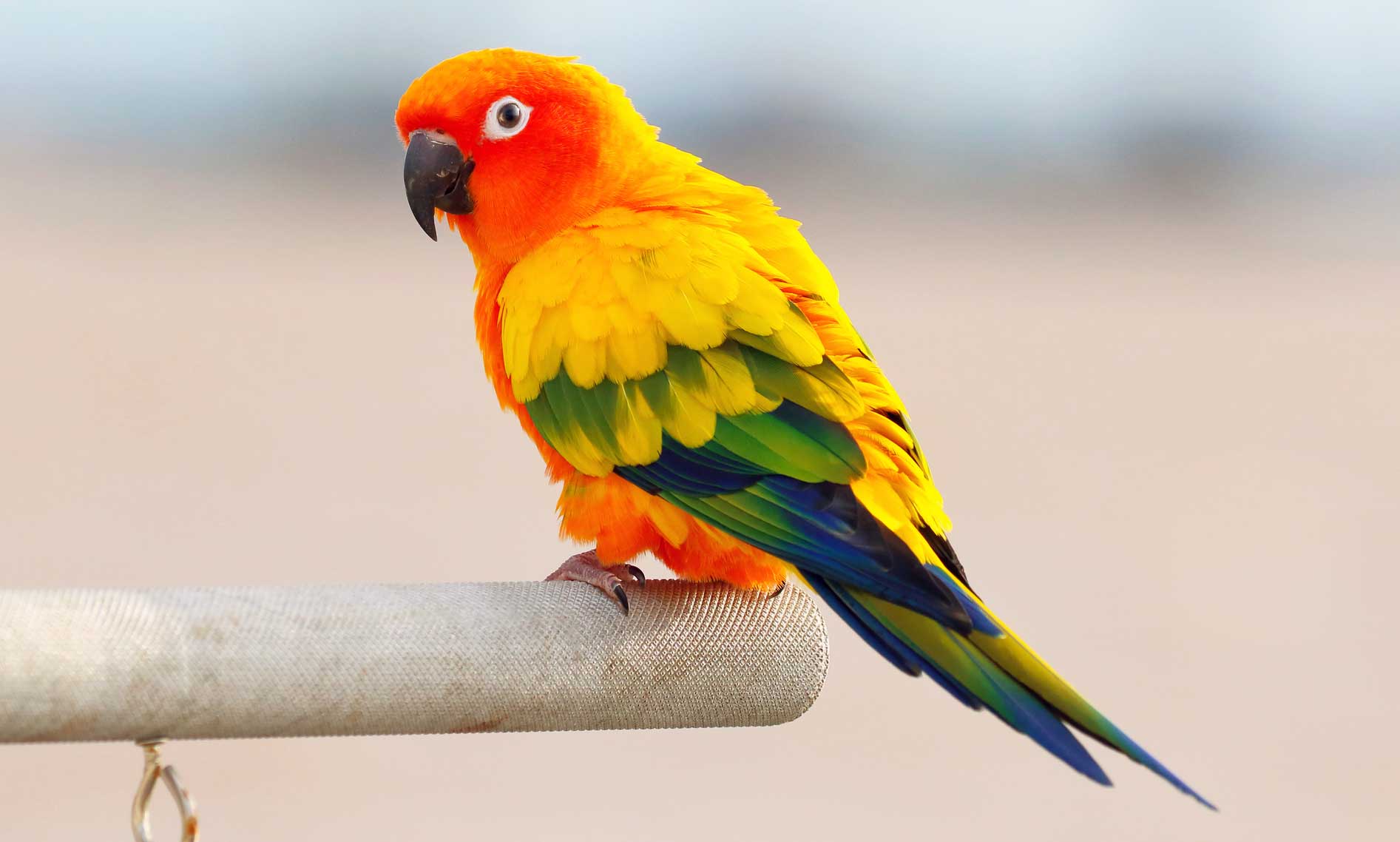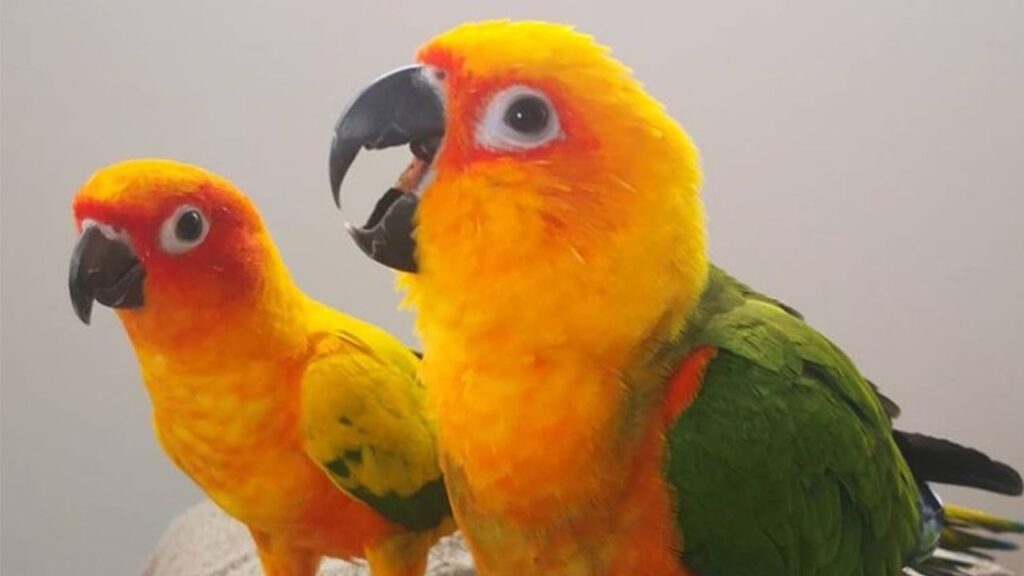Sun Conures are known for their loud, high-pitched calls. They often use their voices to communicate or express excitement.
Sun Conures, also known as Sun Parakeets, are vibrant and social birds native to northeastern South America. Their bright, colorful plumage makes them popular pets. These birds are not only visually stunning but also highly vocal. They often use their loud, high-pitched calls to communicate with their flock or express excitement.
Sun Conures thrive in environments where they receive ample attention and interaction. Potential owners should be prepared for their vocal nature. Proper care and socialization can help manage their noise levels. Understanding their behavior ensures a happy, healthy pet bird.
Introduction To Sun Conures
Sun Conures are vibrant and playful birds. They are known for their striking colors and lively personalities. These birds are a favorite among bird enthusiasts. Understanding their voice and behavior is essential for any Sun Conure owner.
Colorful Appearance
Sun Conures are famous for their bright plumage. Their feathers display a mix of yellow, orange, and red. The wings often show green and blue highlights. Their eyes are dark and expressive.
Here is a table summarizing their color features:
| Body Part | Color |
|---|---|
| Head and Body | Yellow and Orange |
| Wings | Green with Blue Tips |
| Tail | Green and Blue |
Their colorful appearance makes them easy to spot and adore. Sun Conures are often called “living rainbows.”
Natural Habitat
Sun Conures originate from South America. They are found in countries like Brazil, Guyana, and Venezuela. They thrive in tropical and subtropical regions.
They prefer living in savannas, forests, and coastal areas. These birds are known for their social behavior. They often travel in flocks, which helps them stay safe from predators.
In their natural habitat, they have access to a variety of fruits, seeds, and nuts. This diverse diet keeps them healthy and energetic.
Understanding their natural habitat helps in providing a suitable environment at home.

Credit: www.etsy.com
Vocal Characteristics
Sun Conures are known for their vibrant plumage and distinct vocalizations. Understanding their vocal characteristics can help owners better connect with these colorful parrots.
Sound Range
Sun Conures have a wide sound range. They can produce various sounds, from gentle chirps to loud squawks. These birds use different sounds to communicate different emotions and needs.
Here is a quick overview of their sound range:
- Chirps: Soft and pleasant, often during calm moments.
- Squawks: Loud and piercing, usually indicating excitement or alarm.
- Whistles: Varied in pitch, often used in playful interactions.
- Mimicry: They can imitate sounds from their environment.
Volume Levels
The volume levels of Sun Conures can vary greatly. They are known for their loud calls, which can be heard from a distance. This is a natural behavior in the wild to communicate across long distances.
Here are some key points about their volume levels:
- Morning Calls: Typically loud and clear, signaling the start of the day.
- Evening Calls: Can be equally loud, marking the end of daily activities.
- Alert Calls: Very loud and urgent, used to warn of potential threats.
- Contentment Sounds: Usually quieter, such as soft chirps when they are happy.
Understanding these vocal characteristics can help you better interact with your Sun Conure. These birds use their voice to express a wide range of emotions and needs.
Communication Patterns
Sun Conures are known for their vibrant colors and lively personalities. Their communication patterns are equally fascinating. These birds use a variety of vocalizations to interact with their environment and each other. Understanding their communication can help you build a stronger bond with your Sun Conure.
Social Interactions
Sun Conures are highly social birds. They use different sounds to communicate with their flock. These birds often emit contact calls to keep track of each other.
Common social interactions include:
- Chirping: A sign of contentment and happiness.
- Squawking: Often indicates excitement or alertness.
- Whistling: Used to attract attention or express curiosity.
Each sound has a unique meaning. Knowing these can help you understand your bird better.
Mating Calls
During the mating season, Sun Conures have distinct vocalizations. These calls are louder and more persistent. Mating calls are used to attract potential mates and establish territory.
Key features of mating calls:
- Volume: Mating calls are usually louder.
- Frequency: These calls occur more frequently during the day.
- Pattern: Often repetitive to ensure they are heard.
Recognizing these calls can help in understanding your bird’s needs during this period.
| Vocalization | Purpose |
|---|---|
| Contact Calls | Keep track of flock members |
| Chirping | Express contentment |
| Squawking | Indicate excitement |
| Whistling | Attract attention |
| Mating Calls | Attract mates |

Credit: be.chewy.com
Behavioral Traits
Sun Conures are known for their vibrant colors and lively personalities. Their behavior is a big part of their charm. Understanding their behavioral traits helps in providing the best care for them.
Playfulness
Sun Conures are extremely playful birds. They love toys and games. A variety of toys keeps them happy and engaged.
- Chew toys
- Rings and bells
- Puzzle toys
They also enjoy interactive playtime with their owners. This strengthens the bond and keeps them mentally stimulated.
In the wild, they play with sticks and leaves. Mimicking this in captivity enhances their happiness. Playing fetch or hide-and-seek are great activities.
Attention-seeking
Sun Conures are known to be attention-seekers. They love being the center of attention. Ignoring them can lead to loud calls.
They often use their voice to get noticed. They might screech or mimic sounds to grab attention. It’s essential to give them enough social interaction.
A lack of attention can lead to behavioral problems. Regular interaction helps in keeping them content and well-behaved.
They also enjoy learning tricks and performing. This not only entertains them but also pleases their owners.
In summary, understanding their need for attention and playfulness ensures a happy and healthy Sun Conure.
Training And Taming
Training and taming a Sun Conure can be a rewarding experience. These vibrant birds are known for their playful nature and intelligence. With patience and consistency, you can teach them various tricks and commands.
Basic Commands
Begin with simple commands to establish a foundation. Use short, clear words to avoid confusing your bird.
- Step Up: Gently press your finger against their chest. Say “Step Up” clearly.
- Step Down: Move your hand slightly down. Encourage them to step onto a perch.
- Stay: Hold your hand in front of them. Say “Stay” to keep them in place.
Repeat these commands daily. Reward them with treats and praise.
Building Trust
Trust is essential for training. Spend time with your Sun Conure daily. Bond with them through gentle interactions.
- Hand Feeding: Offer their favorite treats from your hand. This builds a positive association.
- Soft Talking: Speak to them in a calm and soothing voice. This helps them feel safe.
- Playtime: Engage in interactive play with toys. This strengthens your bond.
Remember, patience is key. Avoid sudden movements that might scare them.
| Command | Action | Reward |
|---|---|---|
| Step Up | Press finger to chest | Treat and praise |
| Step Down | Move hand down | Treat and praise |
| Stay | Hold hand in front | Treat and praise |

Credit: m.youtube.com
Common Vocal Issues
Sun Conures are known for their vibrant colors and even more vibrant voices. While their vocalizations can be charming, they can also present certain challenges for pet owners. Understanding common vocal issues can help you maintain a happier household and a healthier bird.
Excessive Screaming
Excessive screaming is a common issue among Sun Conures. This can be particularly bothersome in a home setting. Here are some reasons why your Sun Conure might scream excessively:
- Boredom: Birds need mental stimulation.
- Attention-Seeking: They scream to get your attention.
- Hunger: Check if they need food or water.
- Discomfort: Ensure their cage is comfortable.
To reduce screaming, provide toys, spend quality time, and maintain a routine.
Silence
Silence in a Sun Conure can be as concerning as excessive noise. If your normally vocal bird becomes quiet, it could signal a problem. Some possible reasons for silence include:
- Illness: Birds often become quiet when they are sick.
- Stress: Changes in the environment can cause stress.
- Depression: Lack of interaction can lead to sadness.
- Injury: Check for any signs of physical harm.
If your Sun Conure is unusually silent, consult a vet to rule out health issues.
Health And Well-being
Sun Conures are vibrant and energetic birds. Their health and well-being are crucial for their lively voice. Proper care ensures they remain happy and healthy.
Diet Impact
A balanced diet is essential for Sun Conures. Fresh fruits and vegetables should be part of their daily intake. Seeds and nuts are also important but should be given in moderation.
| Food | Frequency |
|---|---|
| Fruits (apples, bananas, berries) | Daily |
| Vegetables (carrots, spinach, peppers) | Daily |
| Seeds and Nuts | Occasionally |
Avoid giving them chocolate, caffeine, or avocado. These can be harmful. Fresh water should always be available for them.
Environmental Factors
The environment plays a key role in their well-being. Ensure the cage is spacious enough for them to move. Place perches at different heights to keep them active.
- Provide toys to stimulate their mind.
- Keep the cage clean to prevent infections.
- Ensure they get enough sunlight or UV light.
A quiet and stress-free environment helps maintain their health. Avoid placing the cage in noisy or busy areas.
Tips For Owners
Sun Conures are vibrant and social birds. They are known for their loud voices. Owners need to know how to manage their sounds. They also need to keep them entertained. Here are some tips to help.
Noise Management
Sun Conures can be very loud. It’s important to manage this. Here are some tips:
- Provide a quiet space for your bird.
- Avoid loud noises around them.
- Use a cover for their cage at night.
- Speak softly to encourage calm behavior.
Enrichment Activities
Sun Conures need mental stimulation. Here are some activities:
- Provide a variety of toys.
- Rotate toys to keep them interesting.
- Teach simple tricks using treats.
- Allow supervised out-of-cage time.
Conclusion
Understanding the unique voice of Sun Conures enhances your bond with these vibrant parrots. Their expressive calls and playful nature make them fascinating pets. Proper training and attention can help manage their vocal tendencies. Embrace the joy and challenges of owning a Sun Conure, and enrich your life with their lively presence.
Ryan Everhart is a passionate bird enthusiast and blogger, primarily writing on his website, Avian Whispers. His journey into the world of bird blogging began with a deep interest in parrots, a species that captivated his attention for their intelligence and social behavior. Over time, his content expanded to cover a broader range of bird species, offering insights into bird behavior, care, habitats, and conservation.
Ryan is dedicated to educating his audience, which includes both new bird owners and seasoned enthusiasts. His writing is filled with personal experiences, expert knowledge, and practical advice on bird care. Through Avian Whispers, he aims to foster a deeper appreciation for birds, emphasizing their role in nature and the joys of having them as pets.
Starting with articles focused on parrots, Ryan’s work now encompasses a diverse range of topics such as feeding, training, habitat enrichment, and bird health. His love for birds extends beyond parrots, diving into various avian species. His informative and heartfelt writing reflects his commitment to the well-being of birds and the desire to help others connect with these creatures.
As a growing voice in the bird blogging community, Ryan strives to provide a platform where bird lovers can learn, share experiences, and connect over a shared passion for avian life. His blogs are not only educational but also serve as a reminder of the importance of protecting and nurturing the bond between humans and birds.




